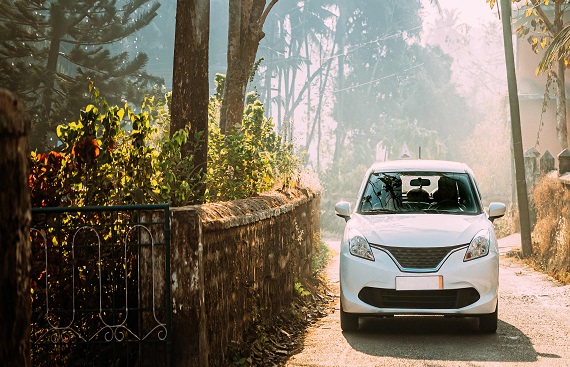Know the important terms of motor insurance with Bajaj Finance

To keep up with the growing digitalization, insurance providers have started offering insurance policies online. So, you can avail of policies like motor insurance easily and directly from them. This also helps you to enjoy hassle-free renewal of your two-wheeler and car insurance policies online with the insurer.
However, the insurance details may contain many jargons, and decoding them is a challenge for a newbie.In addition, understanding a few motor insurance terminologies may be complicated if you decide to buy the policy online without any agent intervention.Therefore, before buying any motor insurance policy, it's necessary to understand the terms used in their policies.
Here’s a guide to help you understand the basic terms of motor insurance and choose the right policy that suits you the best.
Own-damage (OD) cover
Own Damage (OD) covers the expenses of repairing and replacing parts of the owner’s vehicle that may have suffered damages due to the causes mentioned below:
- Earthquake
- Riots, terrorism, and strikes
- Fire
- Explosion, self-ignition, and lightning
- Theft and burglary
- Natural calamities like floods, landslides, cyclones, etc.
- Malicious acts
- Accidental external means
- Accidents occurred while in transit
However, third-party liabilities are not covered under OD.
Third-party liability (TP)
Third-party liability cover is an integral part of both Bike insurance and car insurance. As per the Motor Vehicles Act, vehicle owners must have third-party insurance to ride/drive on Indian roads. A third-party two-wheeler or car insurance policy covers the injury or damage caused to a third party's life or property due to an accident by your vehicle while plying it in a public place.
Sum Insured (SI)
Sum insured is the maximum coverage amount that the insurer offers against the benefits chosen in the motor insurance policy. The sum insured is determined based on the Insured Declared Value (IDV) of the vehicle.
Insured Declared Value (IDV)
IDV is the present market value of the vehicle. The insurer will calculate the IDV of your car or bike based on the age of the vehicle and the manufacturer's listed selling price.
Add-on cover
Add-ons are the additional benefits you can add to the base policy by paying anextra sum on the set premium. However, these benefits vary from insurer to insurer.
Bajaj Finance offers add-ons like zero depreciation cover, Return to Invoice (RTI) cover, personal accident cover for passengers and No-claim Bonus (NCB) protection.
No-claim Bonus (NCB)
If you have a no-claim policy period, your insurer will reward you with a bonus on the renewal for the next period. It ranges from 20% to 50% of the premium, depending on the claim-free years.
Remember that NCB is given to the vehicle owner and not to the insured vehicle. Hence, you can transfer the existing NCB to your new vehicle when you purchase one.
Compulsory deductible
A compulsory deductible is an amount you must pay to your insurer when you raise a claim against a motor insurance policy.
As per the rules of IRDAI, the compulsory deductible for four-wheelers whose engine capacity is up to 1500cc is  1,000, and for those beyond this capacity is
1,000, and for those beyond this capacity is  2,000. However, the insurers usually charge a higher compulsory deductible for older cars and those with higher cubic capacity. For two-wheelers, it stands at
2,000. However, the insurers usually charge a higher compulsory deductible for older cars and those with higher cubic capacity. For two-wheelers, it stands at  100.
100.
Voluntary excess
Most policies have a standard or compulsory deductible amount, which may vary from insurer to insurer. However, if you wish to increase the deductible amount, you can opt for voluntary excess or voluntary deductible. A higher voluntary excess can reduce your premium. Thus, you can get a discount ranging from 20% to 35% on the premium, depending on the voluntary deductible chosen.
Certificate of Insurance
Apart from the policy documents, your insurer will issue a separate certificate of insurance, which you need to carry in the vehicle. This certificate contains all the crucial details and verifies the existence of an insurance policy. Issuing the certificate of insurance is mandatory as per rule 141 of Central Motor Vehicle Rules, 1989.
PUC certificate
A Pollution Under Control (PUC) certificate is mandatory for all vehicles plying on Indian roads, and without that, you won't be able to renew or purchase your motor insurance policy. The PUC verifies your vehicle's emission is in line with the emission standards.
Anti-theft devices
By installing anti-theft devices in your vehicle, you will be eligible to get a discount on your premium for own damage as it reduces the chances of vehicle theft.
Cashless garage
Most motor insurance companies offer cashless services to the policy holder through their network garages. The insurer settles all the service bills directly with the empanelled service centres. By opting for a two-wheeler or car insurance policy with Bajaj Finance, you can get access to over 5,000+ network garages for cashless services across India.
However, if you have a preferred service centre, which is not empanelled with the chosen insurer, you can pay the bills to your service centre directly. Then later, you can make a reimbursement claim to your insurer.
The terms mentioned above are the most common ones that help you understand motor insurance policy documents better. Therefore, weigh all the pros and cons of the policy by evaluating the benefits offered against the given premium.
Bajaj Finance offers comprehensive motor insurance policies provided by top insurers to ensure you get complete security for your vehicle. So, make a smart choice and choose the right motor insurance for your vehicle with Bajaj Finance.
Read More News :

